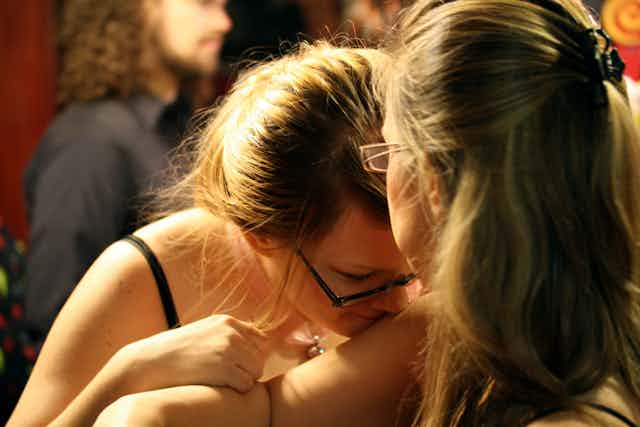Singld Out, an online dating service based on “cutting-edge” science, has the solution for busy singles to sniff out the perfect companion. Literally.
The dating site, in conjunction with a company called Instant Chemistry, offers its subscribers a DNA-based compatibility check of the genes underlying natural body scent. The site promises better sex, healthier children and greater long-term satisfaction than genetically-incompatible schmucks who stupidly rely on meeting people to start relationships.
Just order a DNA kit, spit in the tube, mail it in and wait for the verdict.
So, should you drop US$299.99 a year for a perfect match and eternal happiness – or is Singld Out s(m)elling a load of crap?
The evolution of odour preference
When we think about the evolutionary threats faced by our ancestors, we like to imagine sabre-tooth tigers and angry, spear-wielding tribesmen. In reality, a great deal of natural, and indeed sexual selection, was driven by the pervasive threat of communicable disease.
In humans, cellular and antibody immune responses are regulated by products of the genome called the major histocompatibility complex (MHC).
What does any of this have to do with dating?
Well, given the pressure placed on our ancestors to avoid disease, mating with a partner whose immune system is different might provide benefits to offspring. This is because more varied MHC genes may code for antibodies that are better able to detect and respond to a wider range of pathogens.

Evolution may have selected for this attraction to dissimilar immune systems in mates, producing offspring with greater MHC diversity. One method of assessing immune function is through sense of smell, as MHC-byproducts occur in bodily fluids such as sweat and saliva.
Singld Out proposes that by typing these genes, they are able to find perfect matches based on genetic MHC dissimilarity. Multiple studies have actually observed such MHC-dissimilar odour preferences across numerous animal species.
Frustratingly though, human relationships tend to be a lot more complicated than your average rat pairing (no offense to rodent readers). Support for the idea that our ancestors were immune-system discriminant lovers following their noses to an ideal relationship, and that we still are today, is a lot more mixed.
The science of sexy smells
The first human experiment testing MHC-dissimilarity odour preference is known affectionately as the smelly t-shirt study.
Researchers had 44 men wear the same t-shirt for two consecutive nights without bathing, washing or otherwise preventing their stench from thoroughly seeping into their clothes. A group of lucky women then rated the pleasantness (or chose the least awful) of the shirts – and the study did indeed find a preference for men with dissimilar MHC-genes. Good news for Singld Out and their customer base, right? Well, no.
See, the researchers found a preference for dissimilarity, but only sometimes. It turns out that women who were using an oral contraceptive while assessing potential mates’ body odour were actually more inclined to prefer similar MHC smells. Further research has, if anything, only complicated interpreting how odour affects attractiveness.

Over a number of studies, researchers have found conflicting results. For example, one study found a preference for dissimilarity in male raters of female odour but not for female raters, while another observed preference for similarity only of genes inherited from the father.
Other research has found preferences for odour shift across relationship status, contraceptive use, and ovulatory cycle, while one study has shown indifference towards similarity altogether.
Safe to say, there is little consensus amongst the scientific community as to how, and even if, MHC-dependent selection operates in humans.
Smell preference outside of the lab
To see if people actually do match based on MHC, scientists have genotyped multiple populations and tested the similarity of partners. Most of these results have either found no effect of MHC genes or found that populations are actually more similar in MHC genes than expected by chance. Only one study has shown convincing evidence of MHC-dissimilar preferences.
But the population studied was a highly separatist, religious community where the use of contraception was not allowed; hardly an accurate model for Singld Out’s demographic. MHC-dissimilarity preference in this case may have been a method of avoiding inbreeding, rather than a search for diverse immune system partners.
Singld Out’s strongest case for matching based on MHC-dissimilarity comes from a single behavioural study. Women reported lower levels of sexual responsiveness and sexual satisfaction when they shared MHC genes with their partners. No effect was found for males, though, and the strength of this effect in women varied over the ovulatory cycle.

Making sense of smells
From a comprehensive review of a large number of studies from multiple populations, across multiple methodologies, researchers have concluded:
studies showing some MHC involvement suggests there is a real phenomenon that needs further work to fully elucidate.
So, does MHC-similarity influence partner choice?
Yes, in a very tricky, context-dependent, multi-interactional way. Choice of relationship partner is an immensely complex ballet of biology, culture and circumstance; genes are just one part of the story. Thankfully, our natural mate choice mechanisms, evolved over millennia, have already equipped us with sophisticated preference systems to get us the best we can – that’s what “sexual chemistry” is.
Should you trust Singld Out to accurately match you based on the genetics of body odour alone?
Well, no. Not unless you happen to be a non-ovulating, non-contraceptive using woman who needs help avoiding accidental sex with close genetic relatives.

